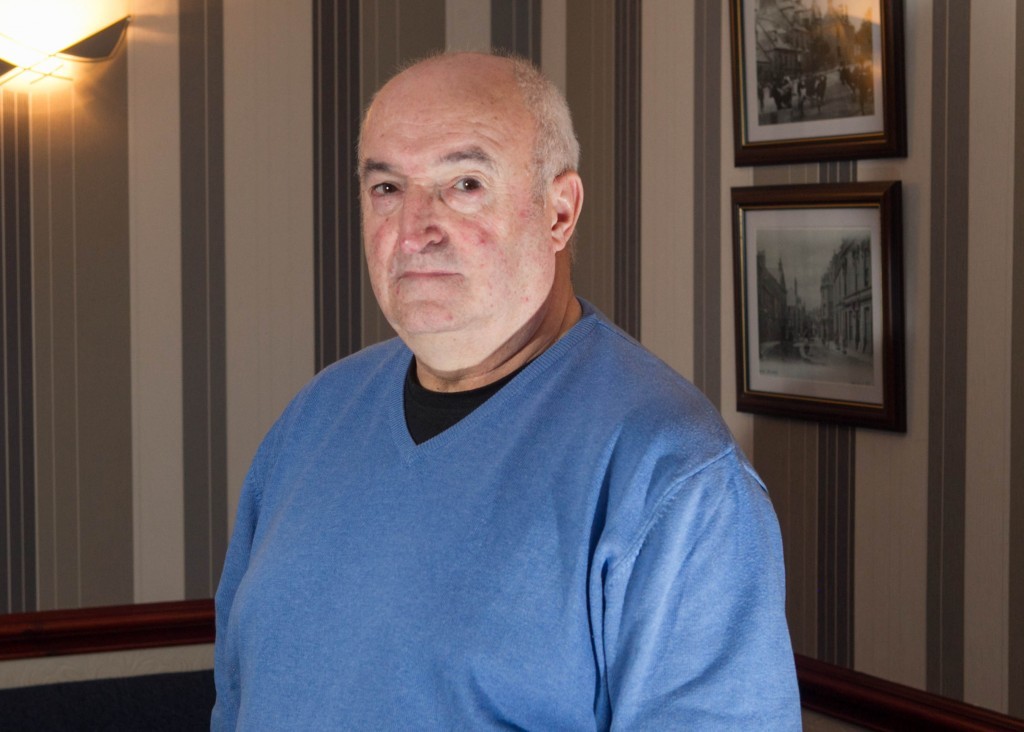
Trevor Jones has developed peritoneal mesothelioma, which affects the lining of the stomach and it’s feared he may have got it by eating meals and snacks contaminated by the lethal substance.
The 66-year-old former engineer, of Brechin, Angus, worked in communications alongside cable layers who drilled through walls lined with asbestos.
His lawyers are now investigating whether microscopic fibres from the drilling found their way into his food.
“I was stunned when doctors told me I had mesothel-ioma,” said the grandad-of-five, who was diagnosed with the lethal cancer in December after taking a routine bowel screening test.
“I would sit in my work clothes eating sandwiches at my desk or in the canteen.
“If any asbestos fell on your clothes, you brushed it off casually with your hands not knowing the danger.”
He added: “We were never warned that we worked in an area with asbestos. I certainly never thought this cancerous substance could be swallowed and cause cancer.
“I have it and I know it will kill me. It will be painful but I hope drugs will control that.”
Deaths from asbestos-related diseases are predicted to reach at least 200,000.
Tragically, many of the victims will not be aware they are at risk until it is too late.
The figures are the grim legacy of the millions of tons of the dust shipped to the UK to make homes, schools, offices and factories fire-resistant.
In the majority of mesothelioma cases, the victims’ lungs are affected.
But Trevor has the peritoneal form of the disease, which affects only 10% of sufferers.
His solicitor, Stephen Irvine, from Morisons Solicitors, said: “Although less common than mesothelioma in the lung, peritoneal mesothelioma is no less devastating for sufferers and their families.
“We have dealt with a number of these cases and the possibility of fibres getting into lunch boxes is one aspect we are looking at.
“In Trevor’s case, we are doing everything we can to help him and his family.”
Trevor, who has three grown-up daughters, was diagnosed with mesothelioma just a month after he was made redundant from his job in communications.
After working for more than 50 years he was looking forward to the next chapter in his life.
“I could have as little as three years to live,” Trevor admitted. “My mum and daughters are devastated but I have to make the most of what time I have left.
“I’ve saved hard over the years and plan to tour a bit of the country while I am still able.”
Trevor is one of dozens of peritoneal mesothelioma patients supported by Asbestos Action (Tayside).
Dianne Foster, support office with AAT, said: “We strongly urge anyone working with asbestos to change out of working clothes and wash before handling food.
“Eating well away from work areas is also strongly advised.
“Many clients tell us employers made them drink milk insisting that it would wash the asbestos through them.”
Some patients with peritoneal mesothelioma are sent to UK national referral centres in Manchester or Basingstoke hospitals for surgery.
Pioneering treatment includes removing the cancerous areas and rinsing the open abdomen with heated chemotherapy drugs.
Surgeon Francesco Polignano, from Ninewells Hospital in Dundee, said: “Patients can contract it through eating asbestos in their food.”
READ MORE
Insisting on a check-up for pancreatic cancer may have saved Andy’s life

Enjoy the convenience of having The Sunday Post delivered as a digital ePaper straight to your smartphone, tablet or computer.
Subscribe for only £5.49 a month and enjoy all the benefits of the printed paper as a digital replica.
Subscribe